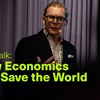angners

Erik Angner
I'm Professor of Practical Philosophy at Stockholm University, where I direct the PPE Program. As a result of serious mission creep, I hold two PhDs – one in Economics and one in History and Philosoph is due out with Penguin in early 2023. I am the author of two other books, (2007) and (3rd Ed., 2020), as well as multiple journal articles and book chapters on behavioral and experimental economics; the science and philosophy of happiness; and the history, philosophy, and methodology of contemporary economics.
Erik Angner: Nudging as Design
Erik Angner, Professor of Practical Philosophy Abstract The nudge agenda due to Richard Thaler and Cass Sunstein has proven polarizing. To advocates, nudging allows us to improve people’s choices and th
We're All Behavioral Economists Now
Journal of Economic Methodology 26(3), 195-207 Abstract Behavioral economics has long defined itself in opposition to neoclassical economics, but recent developments suggest a synthesis may be on the hor

How economics can save the world
Book launch for How Economics Can Save the World (Penguin, 2023) by Erik Angner, professor of practical philosophy and PhD in economics. Economics has always been shadowed by a movement that has been c
The Dangers of Ethnocentrism
Giangiacomo Bravo, professor at Linnéuniversitetet Humans often alter their behavior depending on the opponent's group membership, with positive (e.g., support of same-group members) or negative (e.g.,
Book talk: How Economics Can Save the World
Economics has always been shadowed by a movement called "anti-economics", denouncing its practitioners, attacking its assumptions, rejecting its conclusions, and protesting its influence. In his book H
The nature and dangers of conspiracy theories
(This is a closed workshop) Program: Karen Douglas, 10.00-11.15, “The psychology of conspiracy theories”. Daniel Cohnitz, 11.15-12.30, “Conspiracy Theory Reconsidered: Generalism vs Particularism” Sandwic
The triumph of secular individualism – A new mathematical model offers clear-cut answers to how morals will change over time
Irina Vartanova, Kimmo Eriksson and Pontus Strimling at the Institute for Futures Studies have created a model to predict changes in moral opinion. –Ourmodel did considerably better than all known methPontus Strimling.
The dangers of excessive ambitions within the social sciences
A seminar on the future of social sciences. Main speaker: Jon Elster.Commentators: Tore Ellingsen and Bengt Hansson. Read more in the invitation (pdf)

The dangers of excessive ambitions within the social sciences - Jon Elster replies
www.iffs.se Part 4: Jon Elster answers to comments from Tore Ellingsen and Bengt Hansson. In this lecture Jon Elster diagnoses this flaw and discusses possible remedies. He argues that actual age








